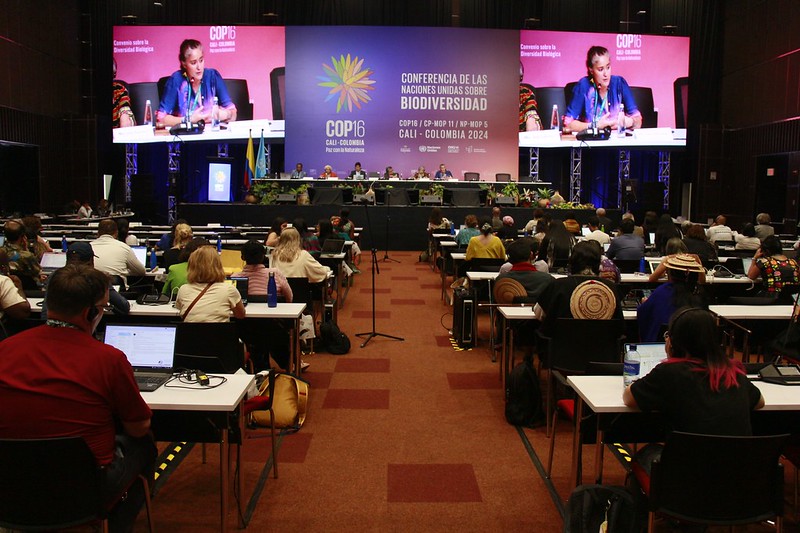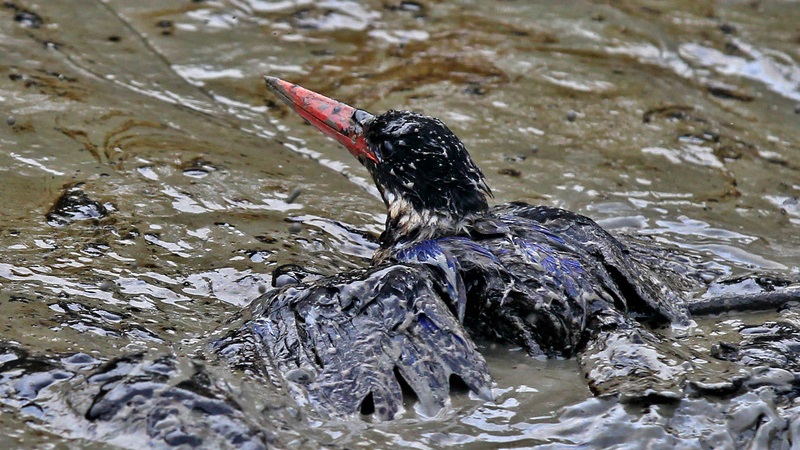Negotiators at the COP16 nature summit have weakened a draft decision on climate change and biodiversity, after removing a mention of the global commitment to “transition away” from fossil fuels agreed at last year’s COP28 climate summit in Dubai.
At the nature COP, countries are expected to produce a text that aligns the priorities of the UN conventions on climate change and biodiversity. Campaigners told Climate Home News that leaving out a stronger mention to fossil fuels was a “missed opportunity”.
In a draft published last week, Colombia proposed using the same fossil fuel language as agreed at COP28. Their proposed paragraph said that the biodiversity goals “will not be possible” to achieve without “transitioning away from fossil fuels in energy systems.”
At COP16, countries clash over future of global fund for nature protection
But the current draft agreement, released late last week, was significantly weakened. Colombia’s suggestion and all mentions of fossil fuels were deleted. Observers told Climate Home that facilitators – Sweden and China – removed the proposal without much opposition at a behind-closed-doors negotiating session last week.
Governments have struggled to include the COP28 fossil fuel pledge in other agreements this year. It barely made it into a United Nations-led “pact for the future” and reports suggested it also struggled to make it into the G20 ministerial statement. In January, Saudi Arabia’s energy minister claimed the pledge is optional.
Weakened text
Alex Rafalowicz is the director of the Fossil Fuel Non-Proliferation Treaty Initiative and had access to closed negotiations. He told Climate Home that the chairs of the contact group – Sweden and China – removed fossil fuels from the text during last week’s negotiations.
“The co-chairs never gave space for an open discussion [on the fossil fuels transition]. There was no actual discusssion on it and when [the draft] was presented it wasn’t there,” Rafalowicz said.
He said that, after the text was removed last week, the Philippines raised questions about the proposal in a new closed negotiation held on Monday. But the co-chairs denied discussions again, the campaigner added.
Indian coal giants pushed for lax pollution rules while ramping up production
Colombia’s environment minister and COP16 president, Susana Muhamad, lamented that fossil fuels had not been a major negotiating issue at the biodiversity summit, with talks only on how to “create synergies” between the two UN conventions.
“My personal opinion is that I would wish that this was a stronger topic. It’s not that strong here at the negotiations. But the political message has been strong,” the COP16 president said.
The draft also includes a call for countries to prevent adverse impacts on biodiversity from responses to climate change such as the expansion of renewable energy. Additionally, it calls on countries to prevent double-counting of biodiversity and climate finance.
Bruna Campos is a senior campaigner at the Center for International Environmental Law (CIEL). She said countries had been “deliberately deleting any mention of transitioning out from fossil fuels” and added it was “disappointing” given the impact of fossil fuels on biodiversity.

A view of the COP16 plenary in Cali, Colombia. (Photo: UN biodiversity)
“Missed opportunity”
Campaigners following the biodiversity talks said they felt disappointed by the fossil fuel exclusion — saying it was a missed opportunity to create additional protections for nature or even “no-go” zones in critical ecosystems nearing tipping points such as the Amazon rainforest.
Raphael Hoetmer, Western Amazon program director at Amazon Watch, said it was “extremely disappointing” that “something so evident such as starting to abandon fossil fuels particularly in ecosystems like the Amazon is not an international consensus”.
A coalition of nearly 150 campaign groups published a joint letter to negotiators calling on them to halt new oil and gas activity in nature-rich areas like the Amazon rainforest and the Verde Island Passage in the Philippines.
Rafalowicz said that, while not including fossil fuel language at COP16 does not necessarily undermine the standing COP28 commitment, it was a “missed opportunity” to provide additional protections for nature.
“If we’re thinking about a future without fossil fuels, then thinking about their impact on biodiversity as a filter to decide where we want to exit fossil fuels first would make sense,” said Rafalowicz. “That’s the missed opportunity.”
(Reporting by Sebastian Rodriguez; editing by Joe Lo)
